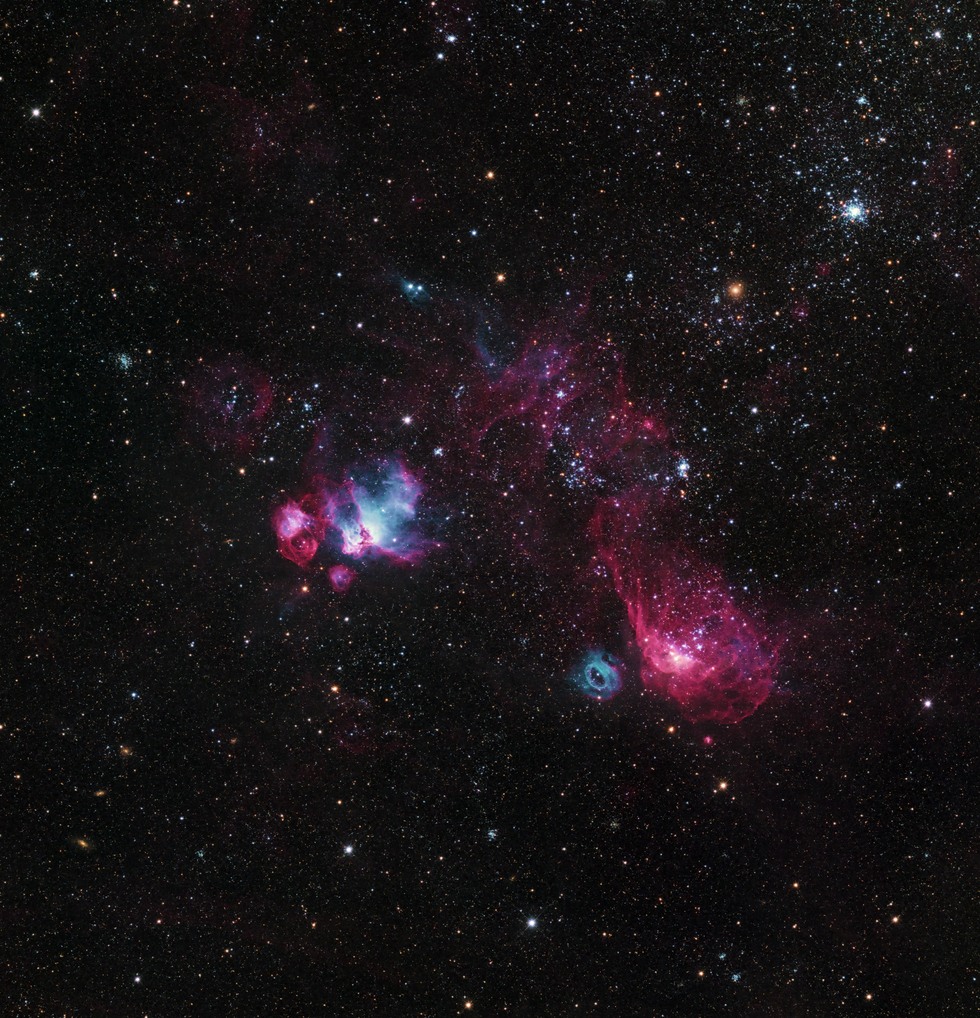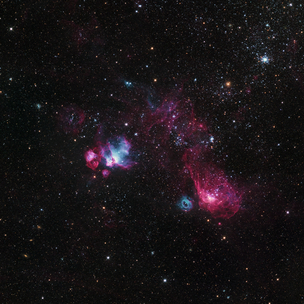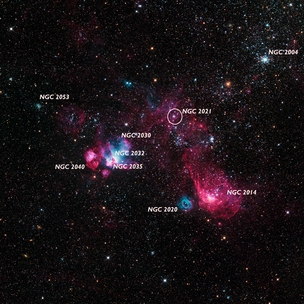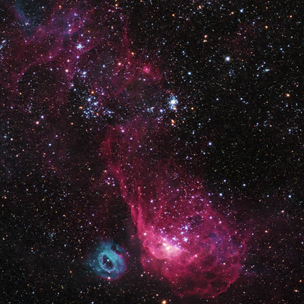NGC 2020, NGC 2021 and many more
2
8
NGC 2020, NGC 2021 and many more
We wanted to start this year (2021) with an image of NGC 2021.
By doing this, we captured many more interesting star clusters and nebulae, among which NGC 2020 and NGC 2014.
Last year, the Hubble Space Telescope made a beautiful image of these 2 nebulae (for its 30th birthday). That HST-image was nicknamed the "Cosmic Reef," because NGC 2014 resembles part of a coral reef floating in a vast sea of stars.
Our image shows a part of the “LMC-4 Supershell”, a giant star-forming region in the Large Magellanic Cloud (LMC), a satellite galaxy of the Milky Way, located 163,000 light-years away.
This image was acquired with the ASA500N telescope (CHI-4) in El Sauce Observatory, Chile.
In the bottom right corner one can see the red nebula NGC 2014 and its blue neighbor NGC 2020. Some of the stars in NGC 2014 are huge. The nebula's sparkling centerpiece is a grouping of bright, hefty stars, each 10 to 20 times more massive than our Sun. The seemingly isolated blue nebula at lower left (NGC 2020) has been created by a solitary mammoth star 200,000 times brighter than our Sun. The blue gas was ejected by the star through a series of eruptive events during which it lost part of its outer envelope of material.
NGC 2021 is a rather small open star cluster on top of both nebulae.
On the left you can see the Seagull nebula NGC 2032 and its neighbor emission nebulae NGC 2030, NGC 2035 & NGC 2040…
Total exposure time of 75 minutes. LRGB 6:3:3:3 in subframes of 300s with each filter.
Processing with AstroPixelProcessor (APP), Photoshop CC with AstroPanel 4.2, Astronomy Tools & Denoise Projects 3 plug-ins.
By doing this, we captured many more interesting star clusters and nebulae, among which NGC 2020 and NGC 2014.
Last year, the Hubble Space Telescope made a beautiful image of these 2 nebulae (for its 30th birthday). That HST-image was nicknamed the "Cosmic Reef," because NGC 2014 resembles part of a coral reef floating in a vast sea of stars.
Our image shows a part of the “LMC-4 Supershell”, a giant star-forming region in the Large Magellanic Cloud (LMC), a satellite galaxy of the Milky Way, located 163,000 light-years away.
This image was acquired with the ASA500N telescope (CHI-4) in El Sauce Observatory, Chile.
In the bottom right corner one can see the red nebula NGC 2014 and its blue neighbor NGC 2020. Some of the stars in NGC 2014 are huge. The nebula's sparkling centerpiece is a grouping of bright, hefty stars, each 10 to 20 times more massive than our Sun. The seemingly isolated blue nebula at lower left (NGC 2020) has been created by a solitary mammoth star 200,000 times brighter than our Sun. The blue gas was ejected by the star through a series of eruptive events during which it lost part of its outer envelope of material.
NGC 2021 is a rather small open star cluster on top of both nebulae.
On the left you can see the Seagull nebula NGC 2032 and its neighbor emission nebulae NGC 2030, NGC 2035 & NGC 2040…
Total exposure time of 75 minutes. LRGB 6:3:3:3 in subframes of 300s with each filter.
Processing with AstroPixelProcessor (APP), Photoshop CC with AstroPanel 4.2, Astronomy Tools & Denoise Projects 3 plug-ins.
SPECIFICATIONS
Telescope
CHI-4 (ASA500N, 50cm)
Camera
FLI PL16803
Location
El Sauce Observatory, Chile
Date of observation
January 2021
Filters
LRGB
Processing
AstroPixelProcessor, Photoshop CC (incl. AstroPanel 4.2 & Astronomy Tools plug-ins), Topaz Denoise
Credits
Astrophotography Group "Volkssterrenwacht A Pien", Ghent (Belgium)
Comments
Looks great! Many interesting targets there.
yep, and inspired by your image :)






